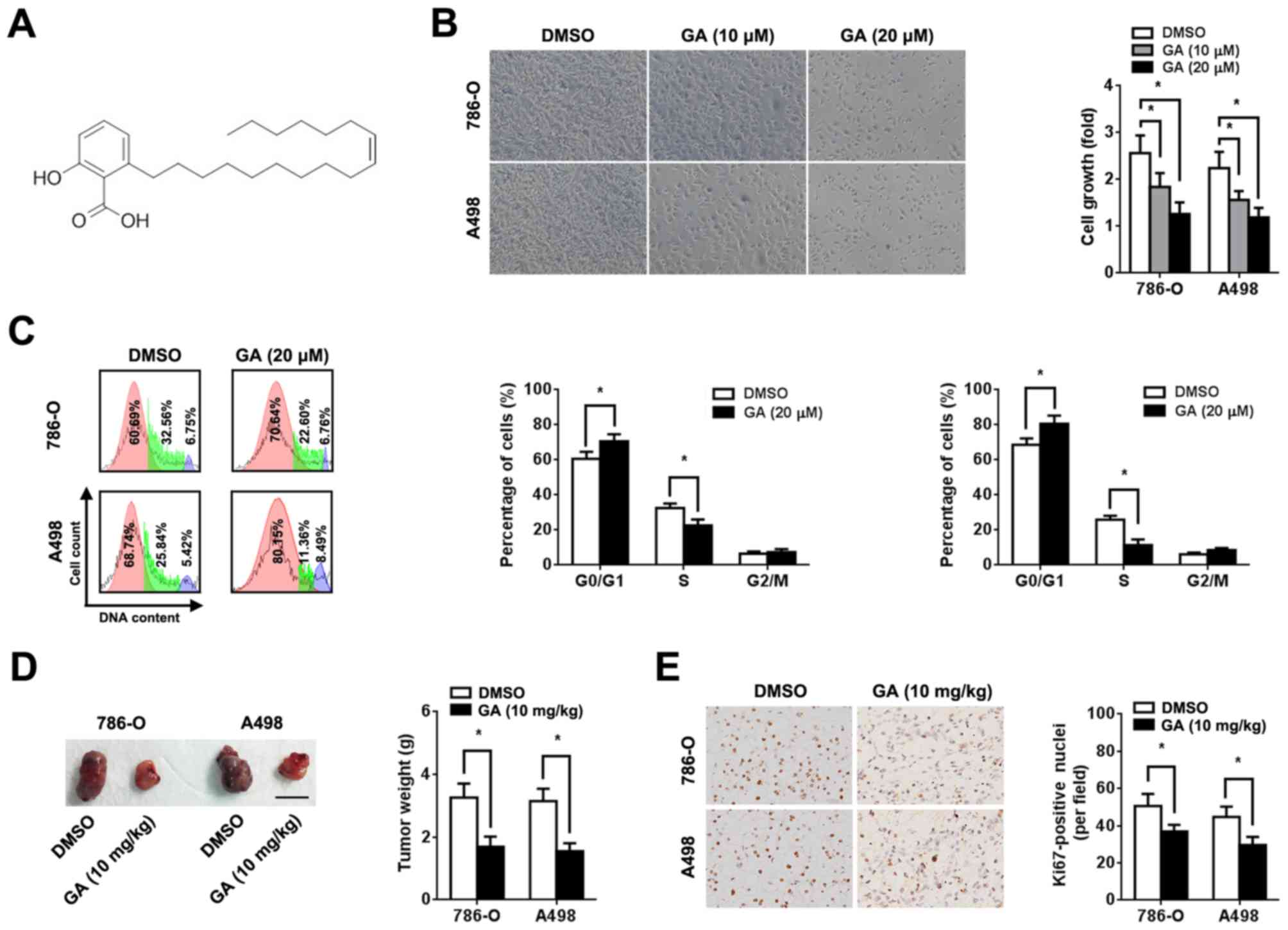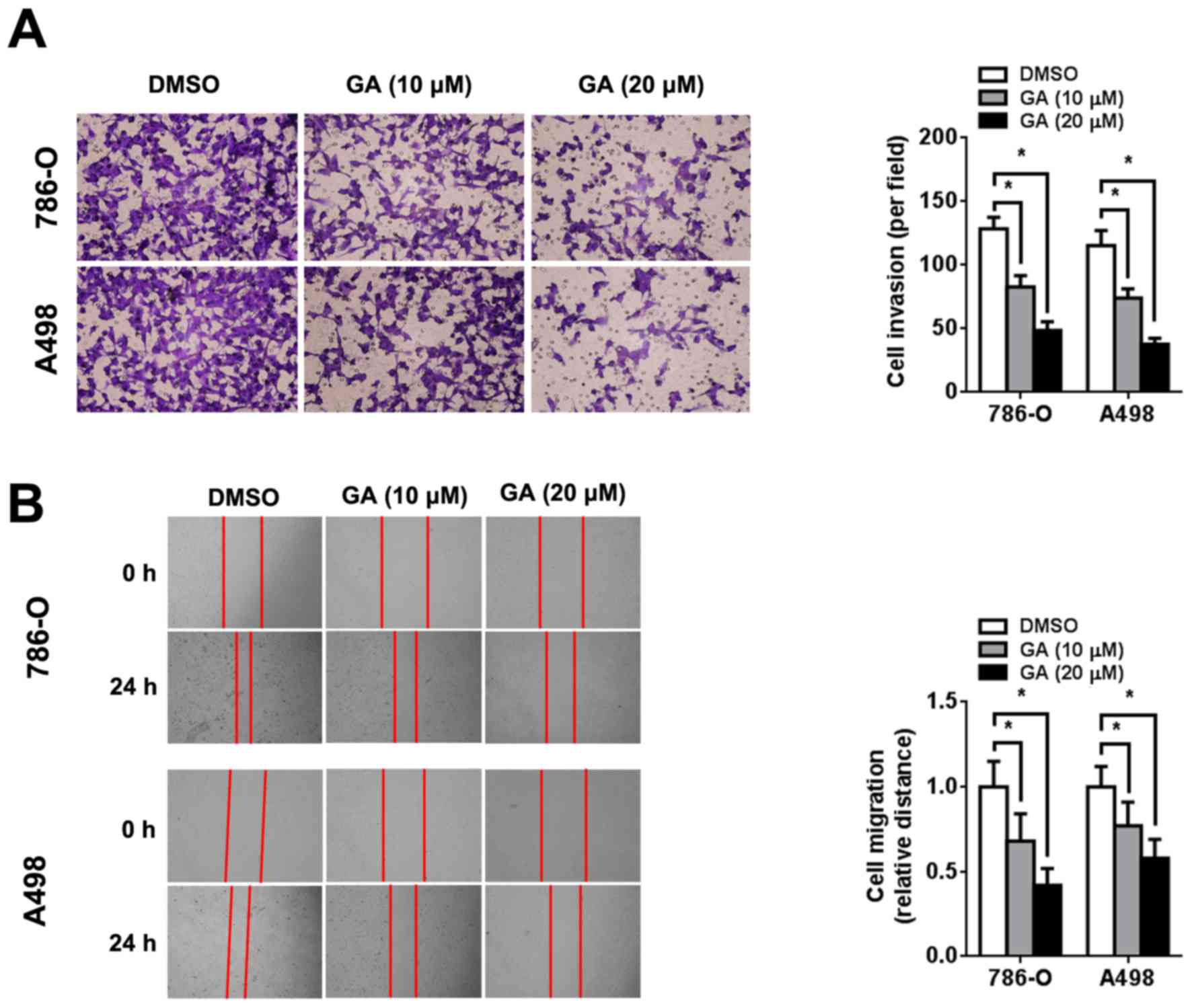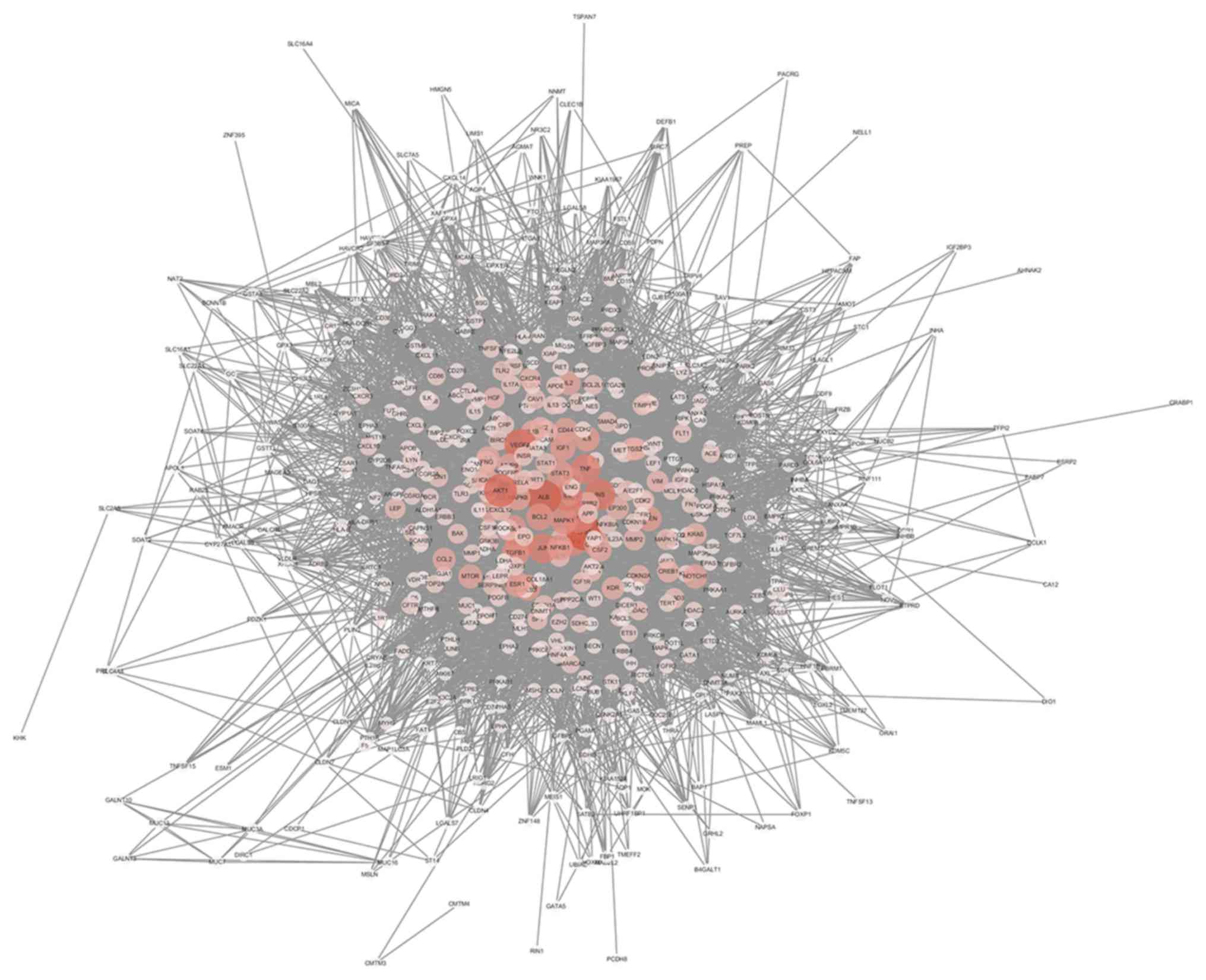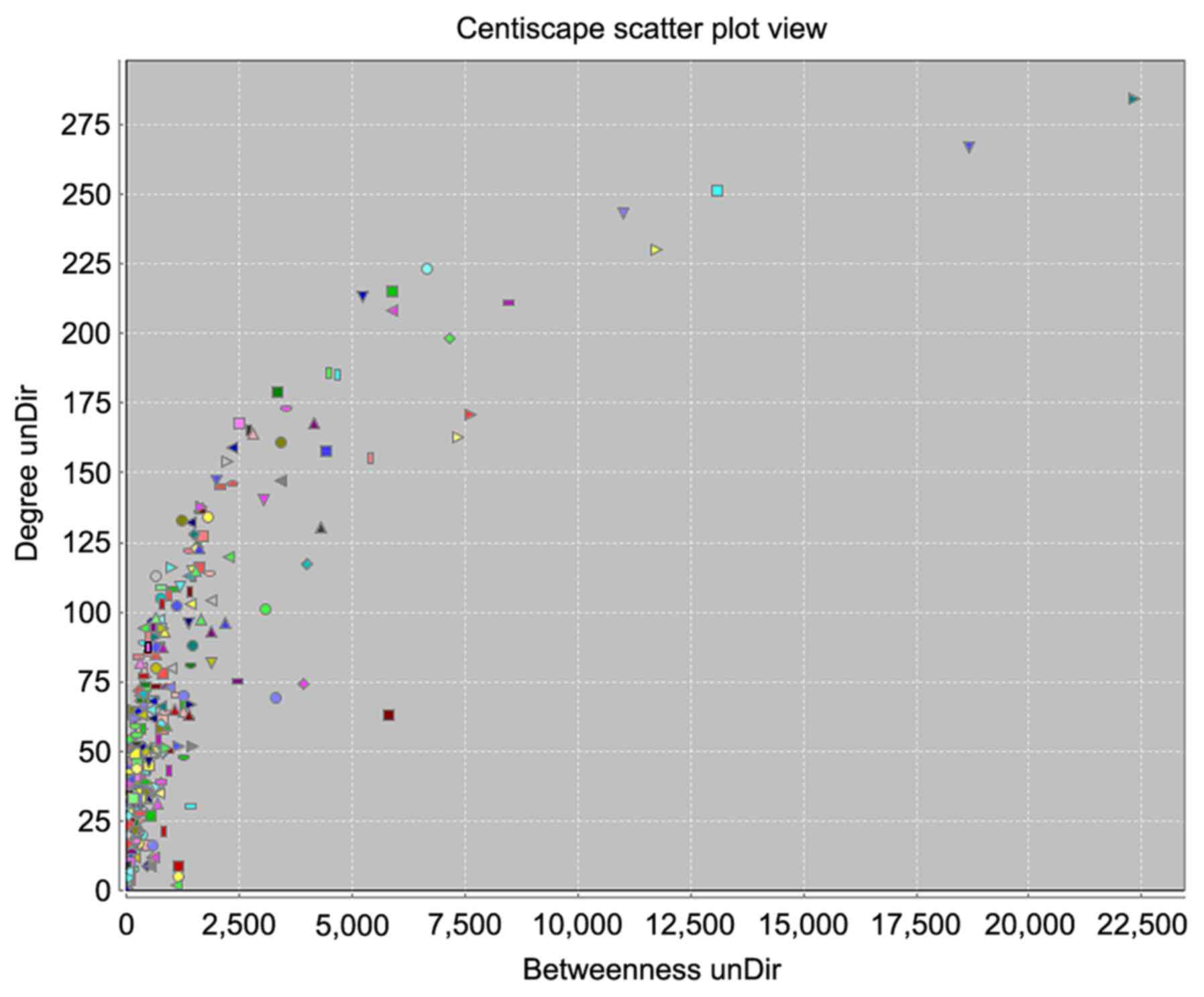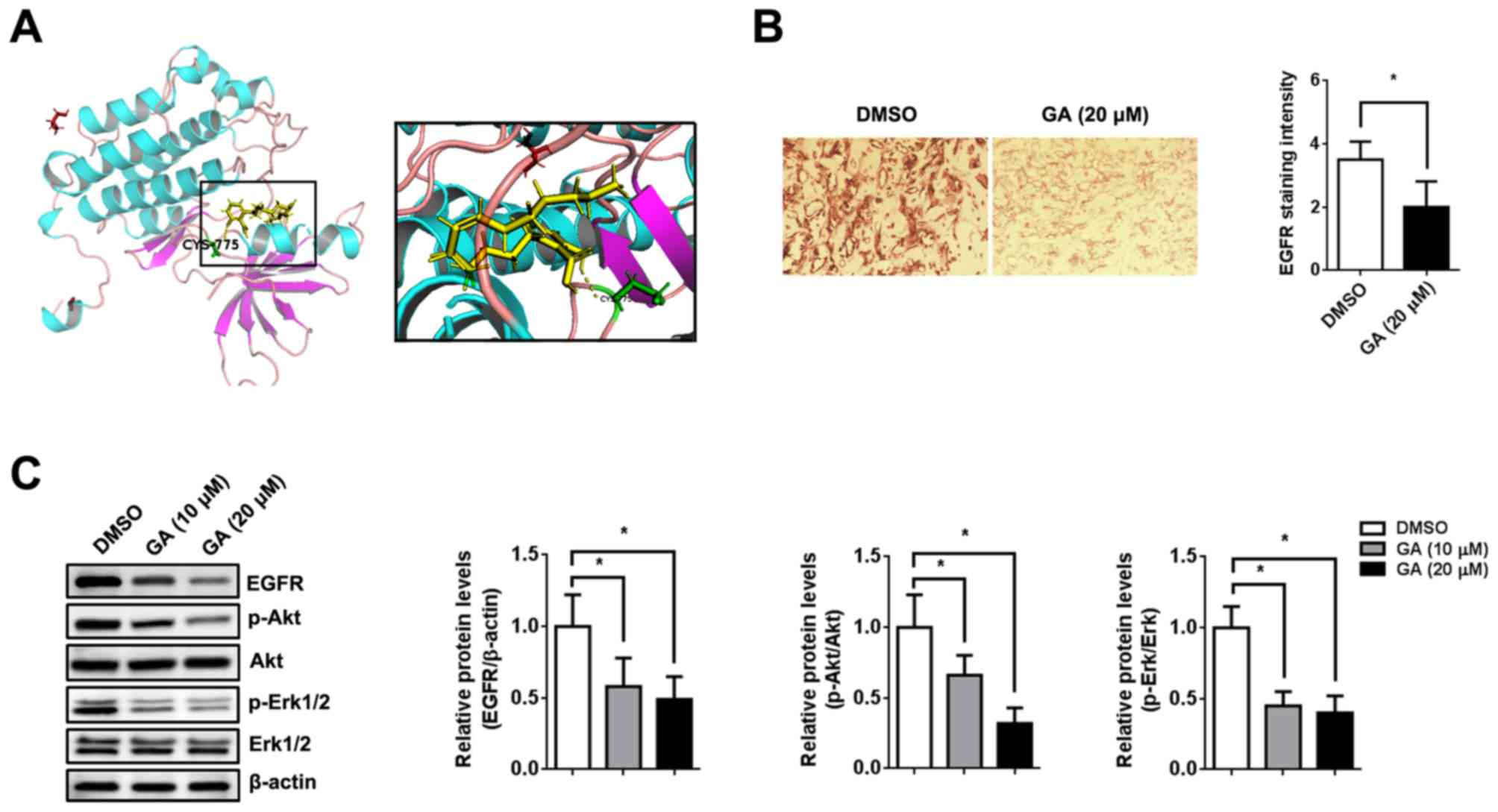|
1
|
Siegel RL, Miller KD and Jemal A: Cancer
statistics, 2017. CA Cancer J Clin. 67:7–30. 2017.PubMed/NCBI View Article : Google Scholar
|
|
2
|
Cindolo L, Patard JJ, Chiodini P, Schips
L, Ficarra V, Tostain J, de La Taille A, Altieri V, Lobel B,
Zigeuner RE, et al: Comparison of predictive accuracy of four
prognostic models for nonmetastatic renal cell carcinoma after
nephrectomy: A multicenter European study. Cancer. 104:1362–1371.
2005.PubMed/NCBI View Article : Google Scholar
|
|
3
|
Patil S, Ishill N, Deluca J and Motzer RJ:
Stage migration and increasing proportion of favorable-prognosis
metastatic renal cell carcinoma patients: Implications for clinical
trial design and interpretation. Cancer. 116:347–354.
2010.PubMed/NCBI View Article : Google Scholar
|
|
4
|
Redova M, Svoboda M and Slaby O: MicroRNAs
and their target gene networks in renal cell carcinoma. Biochem
Biophys Res Commun. 405:153–156. 2011.PubMed/NCBI View Article : Google Scholar
|
|
5
|
Mangolini A, Bonon A, Volinia S, Lanza G,
Gambari R, Pinton P, Russo GR, Del Senno L, Dell'Atti L and Aguiari
G: Differential expression of microRNA501-5p affects the
aggressiveness of clear cell renal carcinoma. FEBS Open Bio.
4:952–965. 2014.PubMed/NCBI View Article : Google Scholar
|
|
6
|
van Beek TA and Wintermans MS: Preparative
isolation and dual column high-performance liquid chromatography of
ginkgolic acids from Ginkgo biloba. J Chromatogr A.
930:109–117. 2001.PubMed/NCBI View Article : Google Scholar
|
|
7
|
Major RT: The ginkgo, the most ancient
living tree. The resistance of Ginkgo biloba L. to pests
accounts in part for the longevity of this species. Science.
157:1270–1273. 1967.PubMed/NCBI View Article : Google Scholar
|
|
8
|
Siegers CP: Cytotoxicity of alkylphenols
from Ginkgo biloba. Phytomedicine. 6:281–283.
1999.PubMed/NCBI View Article : Google Scholar
|
|
9
|
Hecker H, Johannisson R, Koch E and
Siegers CP: In vitro evaluation of the cytotoxic potential of
alkylphenols from Ginkgo biloba L. Toxicology. 177:167–177.
2002.PubMed/NCBI View Article : Google Scholar
|
|
10
|
Zhou C, Li X, Du W, Feng Y, Kong X, Li Y,
Xiao L and Zhang P: Antitumor effects of ginkgolic acid in human
cancer cell occur via cell cycle arrest and decrease the Bcl-2/Bax
ratio to induce apoptosis. Chemotherapy. 56:393–402.
2010.PubMed/NCBI View Article : Google Scholar
|
|
11
|
Lü JM, Yan S, Jamaluddin S, Weakley SM,
Liang Z, Siwak EB, Yao Q and Chen C: Ginkgolic acid inhibits HIV
protease activity and HIV infection in vitro. Med Sci Monit.
18:BR293–BR298. 2012.PubMed/NCBI View Article : Google Scholar
|
|
12
|
Li H, Meng X, Zhang D, Xu X, Li S and Li
Y: Ginkgolic acid suppresses the invasion of HepG2 cells via
downregulation of HGF/cMet signaling. Oncol Rep. 41:369–376.
2019.PubMed/NCBI View Article : Google Scholar
|
|
13
|
Qiao L, Zheng J, Jin X, Wei G, Wang G, Sun
X and Li X: Ginkgolic acid inhibits the invasiveness of colon
cancer cells through AMPK activation. Oncol Lett. 14:5831–5838.
2017.PubMed/NCBI View Article : Google Scholar
|
|
14
|
Hamdoun S and Efferth T: Ginkgolic acids
inhibit migration in breast cancer cells by inhibition of NEMO
sumoylation and NF-κB activity. Oncotarget. 8:35103–35115.
2017.PubMed/NCBI View Article : Google Scholar
|
|
15
|
Baek SH, Ko JH, Lee JH, Kim C, Lee H, Nam
D, Lee J, Lee SG, Yang WM, Um JY, et al: Ginkgolic acid inhibits
invasion and migration and TGF-β-induced EMT of lung cancer cells
through PI3K/Akt/mTOR inactivation. J Cell Physiol. 232:346–354.
2017.PubMed/NCBI View Article : Google Scholar
|
|
16
|
Ye HZ, Zheng CS, Xu XJ, Wu MX and Liu XX:
Potential synergistic and multitarget effect of herbal pair
Chuanxiong Rhizome-Paeonia Albifora Pall on osteoarthritis disease:
A computational pharmacology approach. Chin J Integr Med.
17:698–703. 2011.PubMed/NCBI View Article : Google Scholar
|
|
17
|
Xenarios I, Salwínski L, Duan XJ, Higney
P, Kim SM and Eisenberg D: DIP, the database of interacting
proteins: A research tool for studying cellular networks of protein
interactions. Nucleic Acids Res. 30:303–305. 2002.PubMed/NCBI View Article : Google Scholar
|
|
18
|
Xu R and Wunsch DC II: Clustering
algorithms in biomedical research: A review. IEEE Rev Biomed Eng.
3:120–154. 2010.PubMed/NCBI View Article : Google Scholar
|
|
19
|
Ramadan E, Naef A and Ahmed M: Protein
complexes predictions within protein interaction networks using
genetic algorithms. BMC Bioinformatics. 17:(Suppl 7): S269.
2016.PubMed/NCBI View Article : Google Scholar
|
|
20
|
Wang D, Zhu C, Zhang Y, Zheng Y, Ma F, Su
L and Shao G: MicroRNA-30e-3p inhibits cell invasion and migration
in clear cell renal cell carcinoma by targeting Snail1. Oncol Lett.
13:2053–2058. 2017.PubMed/NCBI View Article : Google Scholar
|
|
21
|
Renal cell cancer treatment (PDQ(R)):
Patient version, in PDQ cancer information summaries. 2002:
Bethesda (MD).
|
|
22
|
Shingarev R and Jaimes EA: Renal cell
carcinoma: New insights and challenges for a clinician scientist.
Am J Physiol Renal Physiol. 313:F145–F154. 2017.PubMed/NCBI View Article : Google Scholar
|
|
23
|
Wang C, Ren Q, Chen XT, Song ZQ, Ning ZC,
Gan JH, Ma XL, Liang DR, Guan DG, Liu ZL and Lu AP: System
pharmacology-based strategy to decode the synergistic mechanism of
Zhi-zhu Wan for functional dyspepsia. Front Pharmacol.
9(841)2018.PubMed/NCBI View Article : Google Scholar
|
|
24
|
Zhang J, Li Y, Chen X, Pan Y, Zhang S and
Wang Y: Systems pharmacology dissection of multi-scale mechanisms
of action for herbal medicines in stroke treatment and prevention.
PLoS One. 9(e102506)2014.PubMed/NCBI View Article : Google Scholar
|
|
25
|
Ma J, Duan W, Han S, Lei J, Xu Q, Chen X,
Jiang Z, Nan L, Li J, Chen K, et al: Ginkgolic acid suppresses the
development of pancreatic cancer by inhibiting pathways driving
lipogenesis. Oncotarget. 6:20993–21003. 2015.PubMed/NCBI View Article : Google Scholar
|
|
26
|
Liu Y, Yang B, Zhang L, Cong X, Liu Z, Hu
Y, Zhang J and Hu H: Ginkgolic acid induces interplay between
apoptosis and autophagy regulated by ROS generation in colon
cancer. Biochem Biophys Res Commun. 498:246–253. 2018.PubMed/NCBI View Article : Google Scholar
|
|
27
|
Zhou CC, Du W, Wen Z, Li JY and Zhang P:
Effects of natural plant ginkgolic acids on the apoptosis of human
Hep-2 cancer cells. Sichuan Da Xue Xue Bao Yi Xue Ban. 40:459–461.
2009.PubMed/NCBI(In Chinese).
|
|
28
|
Yuan H, Ma Q, Cui H, Liu G, Zhao X, Li W
and Piao G: How can synergism of traditional medicines benefit from
network pharmacology? Molecules. 22(E1135)2017.PubMed/NCBI View Article : Google Scholar
|
|
29
|
Stelzl U, Worm U, Lalowski M, Haenig C,
Brembeck FH, Goehler H, Stroedicke M, Zenkner M, Schoenherr A,
Koeppen S, et al: A human protein-protein interaction network: A
resource for annotating the proteome. Cell. 122:957–968.
2005.PubMed/NCBI View Article : Google Scholar
|
|
30
|
Boezio B, Audouze K, Ducrot P and
Taboureau O: Network-based approaches in pharmacology. Mol Inform.
36:2017.PubMed/NCBI View Article : Google Scholar
|
|
31
|
Harris RC, Chung E and Coffey RJ: EGF
receptor ligands. Exp Cell Res. 284:2–13. 2003.PubMed/NCBI View Article : Google Scholar
|
|
32
|
Freed DM, Bessman NJ, Kiyatkin A,
Salazar-Cavazos E, Byrne PO, Moore JO, Valley CC, Ferguson KM,
Leahy DJ, Lidke DS and Lemmon MA: EGFR ligands differentially
stabilize receptor dimers to specify signaling kinetics. Cell.
171:683–695.e18. 2017.PubMed/NCBI View Article : Google Scholar
|
|
33
|
Sigismund S, Avanzato D and Lanzetti L:
Emerging functions of the EGFR in cancer. Mol Oncol. 12:3–20.
2018.PubMed/NCBI View Article : Google Scholar
|
|
34
|
Wang Z: ErbB receptors and cancer. Methods
Mol Biol. 1652:3–35. 2017.PubMed/NCBI View Article : Google Scholar
|
|
35
|
Liu Q, Yu S, Zhao W, Qin S, Chu Q and Wu
K: EGFR-TKIs resistance via EGFR-independent signaling pathways.
Mol Cancer. 17(53)2018.PubMed/NCBI View Article : Google Scholar
|
|
36
|
Cosmai L, Gallieni M and Porta C: Renal
toxicity of anticancer agents targeting HER2 and EGFR. J Nephrol.
28:647–657. 2015.PubMed/NCBI View Article : Google Scholar
|
|
37
|
Liu F, Shangli Z and Hu Z: CAV2 promotes
the growth of renal cell carcinoma through the EGFR/PI3K/Akt
pathway. Onco Targets Ther. 11:6209–6216. 2018.PubMed/NCBI View Article : Google Scholar
|
|
38
|
Liu L, Miao L, Liu Y, Qi A, Xie P, Chen J
and Zhu H: S100A11 regulates renal carcinoma cell proliferation,
invasion, and migration via the EGFR/Akt signaling pathway and
E-cadherin. Tumour Biol. 39(1010428317705337)2017.PubMed/NCBI View Article : Google Scholar
|
|
39
|
Feng ZH, Fang Y, Zhao LY, Lu J, Wang YQ,
Chen ZH, Huang Y, Wei JH, Liang YP, Cen JJ, et al: RIN1 promotes
renal cell carcinoma malignancy by activating EGFR signaling
through Rab25. Cancer Sci. 108:1620–1627. 2017.PubMed/NCBI View Article : Google Scholar
|
|
40
|
Chen F, Deng J, Liu X, Li W and Zheng J:
HCRP-1 regulates cell migration and invasion via EGFR-ERK mediated
up-regulation of MMP-2 with prognostic significance in human renal
cell carcinoma. Sci Rep. 5(13470)2015.PubMed/NCBI View Article : Google Scholar
|
|
41
|
Liang L, Li L, Zeng J, Gao Y, Chen YL,
Wang ZQ, Wang XY, Chang LS and He D: Inhibitory effect of silibinin
on EGFR signal-induced renal cell carcinoma progression via
suppression of the EGFR/MMP-9 signaling pathway. Oncol Rep.
28:999–1005. 2012.PubMed/NCBI View Article : Google Scholar
|















